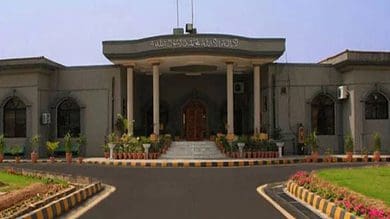The Islamabad High Court (IHC) on Friday observed that the trial court, which convicted Imran Khan in the Toshakahna corruption case, “did wrong” as it adjourned until Monday the hearing on jailed former prime minister’s appeal against his conviction and sentence.
On August 5, a sessions court in Islamabad convicted Khan, 70, in the case filed by the Election Commission of Pakistan (ECP) and sentenced him to three years in prison. The verdict meant he was disqualified from contesting general elections for five years.
Two-member IHC bench comprising Chief Justice (CJ) Aamer Farooq and Justice Tariq Mehmood Jahangiri heard the plea seeking suspension of Khan’s conviction by the trial court’s Additional District and Sessions Judge (ADSJ) Humayun Dilawar.
During the hearing, Advocate Amjad Pervaiz, the ECP’s lawyer, was expected to conclude his arguments.
However, he failed to appear due to being “extremely unwell” — as stated by a member of his team.
His assistant advocate asked the bench for an adjournment saying: “For the last eight months, we never sought adjournment.” He said that doctors had suggested Parvaiz bed rest.
At this, Chief Justice Farooq said: “The request for suspension of sentence is now at a critical stage.” He added that arguments would have been completed in fifteen to twenty minutes.
He further said: “We can also do what the trial court did, but we will not.” “Two wrongs don’t make a right. We will not do what the trial court did.” “We adjourn the case till Monday (August 28), and even if no one comes, we will announce our decision,” Justice Farooq said, adding that what the trial court had done was “wrong”.
At this, Pakistan Tehreek-e-Insaf (PTI) counsel Latif Khosa remarked: “One person has been in jail for twenty days. Will [you] keep the PTI chairman in jail for another three days? “We will not appear in court, do what you have to do,” he said. He requested the bench to suspend the sentence immediately.
“If you are satisfied with their arguments on Monday, then send them back to jail,” he requested.
Besides the sentence, the additional district and sessions judge also imposed a fine of Rs100,000 after finding Khan guilty of graft in the Toshakhana case.
The Supreme Court (SC) Wednesday also acknowledged the “procedural defects” in Khan’s conviction but opted to wait for the IHC’s decision on the former premier’s plea seeking suspension of the three-year sentence.
The PTI in a statement confirmed that the hearing at IHC was adjourned till Monday, August 28, due to the sickness of the counsel of the ECP.
“Delaying tactics on the go on the second day as yesterday. The same lawyer filibustered for quite a while reading old judgments in the court,” the PTI said.
The IHC has been hearing Khan’s appeal since August 22.
The court on Thursday adjourned the hearing until Friday.
The defence team has already completed the arguments.
The Toshakhana case was filed by ruling party lawmakers in 2022 in the ECP, alleging that Khan concealed the proceeds from the sale of state gifts.
The ECP first disqualified him and then filed a case of criminal proceedings in a sessions court which convicted him and subsequently, Khan was sent to jail.
Khan is currently in Attock Jail where he was lodged after arrest following his conviction. He has also been disqualified for five years.
The case alleges that Khan had “deliberately concealed” details of the gifts he retained from the Toshaskhana – a repository where presents handed to government officials from foreign officials are kept – during his time as the prime minister from 2018 to 2022 and proceeds from their reported sales.
According to Toshakhana rules, gifts/presents and other such materials received by persons to whom these rules apply shall be reported to the Cabinet Division.
According to reports, Khan received 58 gifts worth more than Rs 140 million from world leaders during his three-and-a-half-year stint and retained all of them either by paying a negligible amount or even without any payment.









































